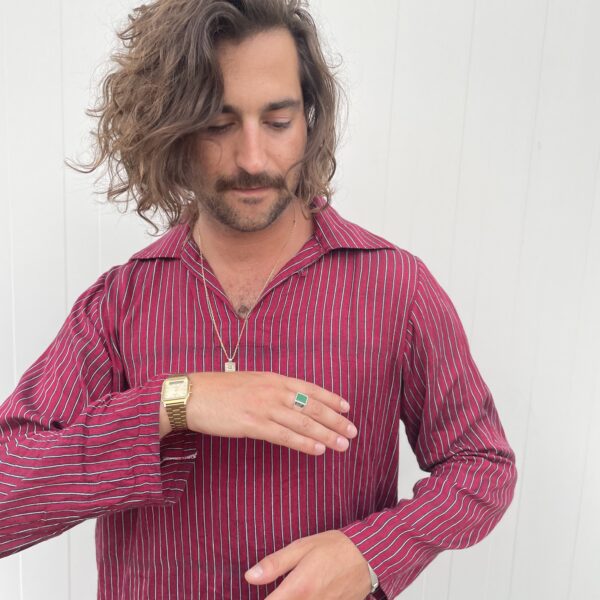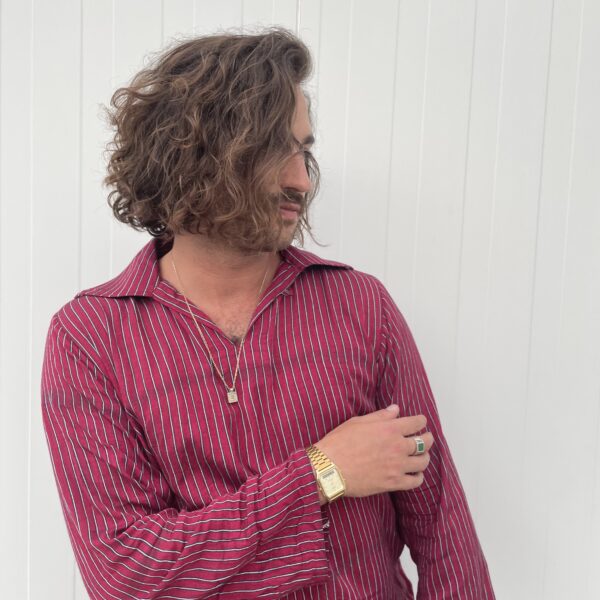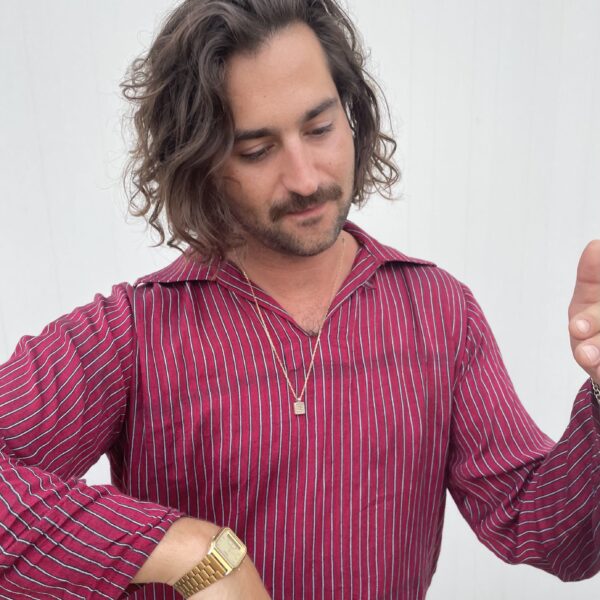We spoke to Shakèd about his upcoming release for Det Gode Selskab as they prepare for their Yoyaku boat and harbour party followed by the official after party at Moving Heads on Sunday.
Shakèd is the latest addition to Det Gode Selskab’s roster, sliding into the record label’s lineup like he was always meant to be there. His debut for the label, Space Invaders thrives in the minimal landscape with elements of Techno and House converging over starved rhythms where there is as much emphasis on the space between the beats as on them.
The Dutch artist is one of the very few non-Norwegians to make it onto the label, sharing many of the sonic traits that has established Det Gode Selskab as one of the leading lights in Norway’s club land.
Space Invaders marks the latest release from the collective-turned-label, re-establishing that prowess for the minimal groove that they have shown now over various VAs and a handful of EPs from the core group of DJs and artists established around the label.
Shakèd taps effortlessly into these minimal ideologies, as the title track swerves into familiar territory with a piercing kick drum and twittering circuit boards. Elsewhere robotic vocals and gleaming stabs bring the futuristic theme to life. The EP moves from one glissando bass line to another, distilling the sound of the record down to a silky shimmer that hovers over infectious grooves.
Shakèd’s experience shines through with a production touch that keeps everything tight and effervescent. With over 10 years working in the electronic music realm his sound is well established. He’s also a busy figure in Amsterdam’s nightlife, and spends his time between various aspects of the music industry there, including doing bookings for Yellow House. Recently he’s been signed to the interwave agency, finding a home with a big pedigree and a roster including familiar names like Magda, Satoshi Tomiie, Cabanne, Maher Daniel, O.BEE & Tomas… and much more.
While he might be new to Det Gode Selskab, he’s no debutant, and it shines through on this latest record. After the official release party at Jaeger a few months ago, Shakèd is back with the Det Gode Selskab this weekend for their Yoyaku boat and harbour party and with the official afters at Jaeger for Hetty and J.André’s Moving heads, we caught up with Shakèd to find out more.
You’ve been working on music for over ten years?
It’s been over twenty years already. I started playing drums when I was 11 and I’m 35 years old now. I started electronic music when I was 15.
It doesn’t surprise me that you tell me you’re a drummer, because there is something about drummers that just have a natural knack for electronic music. It’s that focus on rhythms.
That’s it. It’s very groove and rhythm-based. You only need three pitches and to play with a rhythm and then it starts to work.
As a drummer, were you playing in bands?
Yes, I used to play in punk bands.
What brought you over to electronic music?
I was staying over at a friend’s place and woke up to some strange sounds. It was my mate making beats on fruity loops, and I was, “wow, what the fuck is this, I need to get involved.” Immediately after that, I sold my drum set and bought a laptop and never looked back. Instead of only playing one instrument, which I always thought was kind of boring, now I can play every instrument.
Was there a big learning curve?
So big! It was before Youtube. Even though I’m a nineties kid and I was raised with electronic music like Moby, Faithless, Gorillaz and a lot of Trance, I had zero sense for structure. It took me forever, if I’m being honest. It took me at least 8 years to figure out that I have to put a clap on every second kick.
I’ve spoken to drummer-cum-producers in the past and they often tell me that they’ll incorporate some kind of live drumming in their tracks. Are you in that school of thought?
I never really got that far in drumming. I always found learning notes and learning sheet music very boring. I never took the next step. When I discovered computer music, I started all over and I could just turn knobs and be absolutely mesmerised by it. I didn’t have any clue what I was doing, but I had fun doing it. I would only play live and I would bring my laptop everywhere, plug into an aux cable and tweak filter knobs. Only fifteen years later I started to get somewhere.
You mentioned Trance, which is obviously big in the Netherlands, but were you ever a part of a bigger scene and were you going to any clubs?
I was lucky enough to grow up in a very cultural city called Amersfoort. I had friends who had older brothers that would go to House parties. At some point I won a bet with a friend and got his spare ticket to I Love Techno, in 2005. There I heard Alex Under play a live set and that was such an eye opening moment. From that moment, I didn’t rest until I knew how to do that, and I’m still at it now.
Although you were only tweaking filter knobs in the beginning, today you clearly have a sound as a producer. At what point do you start developing that sound?
My sound is the result of 20 years of electronic music experience, walking around the dance floor and in the scene. This is my take on electronic music. It was influenced by my early days with Faithless and Moby as well as going to that Techno phase in the beginning for me, and then going through hardcore and Trance, and at some point it became minimal and Tech-House. I prefer to call my style Tech-House, because that’s what it is, somewhere between Tech and House. About 7 years ago I got in touch with minimal and the Romanian style, that’s also when my sound became more mature. At the same time it has been influenced by the Dutch school.
Do you feel that when you started making your style of music, that it was a natural evolution or did you have to work at it to get it to that point?
About ten years ago I was scouted by a big agency called David Lewis and they were really big into Tech House and the commercial side of things. It was really then that I noticed that music was so low and unintelligent. It really bothered me. I felt uncomfortable with the quality of music that was presented to people in the commercial segment of the scene. It was around that time that I discovered VBX and Slapfunk and that really pushed me to set the bar for myself. I really invested in taking it to the next level and making really intelligent meaningful music. Slapfunk and VBX are the promoters that showed me the pinnacle of this kind of music.
In your music today there is an accent on the atmosphere and a sound design element. Did you change the way you produced music in the shadow of that experience?
When I first came to the realisation that I wanted to make more intelligent, meaningful music, I first spent a lot of time on trial and error in trying to find my sound and trying to compare my sound to others. That meant that I was putting too much pressure on myself to the point that I was not actually making music anymore, but just being more generic about it. I think it is very important for me that my music is mine and there are no rules around it.
That’s also why I never wanted to do music school, because I really prefer if it’s my own language. I decided to make whatever the fuck is in my body. I don’t try to think or compare it, I just do what’s there. My approach is that I work at it till it’s finished and then upload it to soundcloud. I believe that beauty is in the eye of the beholder. I just make it as best as I can.
Was that process behind space invaders, did you have those tracks up on Soundcloud before Det Gode Selskab nabbed them?
Yes, I usually upload the first version of it and that’s what I send to the label. Space Invaders followed that process.
Did you know of Det Gode Selskab before you sent it to them?
I initially knew them as a fanboy and then a mutual friend of ours Sascha from keepitgoing, he introduced us to each other. Then I invited them to play in Amsterdam for Yellow House, the place that I book for.
It’s not just the Space Invaders EP, but also another one coming on their VA series, Jack‘s Favourites.
Like I said I’m a super fan, and I think we really appreciate each other’s creative output for some reason. It just really clicks that way.
Tell me a little about Yellow House. It seems like you work in many different areas of music, not just an artist.
I also work as a nightlife- and social cultural entrepreneur, to facilitate new talent and keep the landscape fertile for the next generation.
I find that Amsterdam has always had this nurturing awareness of nightlife and is constantly trying to facilitate club culture, even through public funding. Is that still the case?
That is still the case, but it’s not going by itself. You always need people. I felt the call to step up in that way. It goes in phases, and we have a good thing going on now. I strongly believe for the health of our future, we have to keep working together.
What is the main musical outlet in Amsterdam at the moment when it comes to clubbing?
Luckily there’s a lot of people active in the nightlife and there is a healthy mix of different genres. There’s a big Techno community; a big Trance community; and some underground things, but the status quo is still very House orientated. The sort of underground that I love is getting smaller and more niche. It’s had a good run, and it’s good if every couple of years new things come to the horizon as well. At this moment the Dutch scene is reinventing itself towards a new status quo.
But niche is good, because if things get too popular, they tend to get watered down too.
For sure. It’s different because the budget changes. When there’s fewer people showing up, we have to re-invent the parameters for it to work.
What will you be packing in terms of records these days and the upcoming set in Oslo?
I think my sound has changed a lot over the last two years. It has been very minimal and lately I’ve been inspired by the underground where people want a bit more energy, a bit more party and a bit more action, especially after covid. I also feel that, and the urge to bring more energy to my productions and sets. It’s getting back to what I used to do, I used to play a lot of anthems and high energy stuff. When I got into minimal, there were a lot of rules, and now there’s a lot more possible in the underground. All of a sudden I feel a lot more free and confident.




